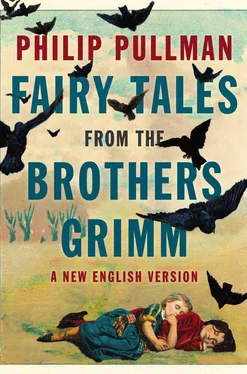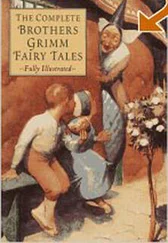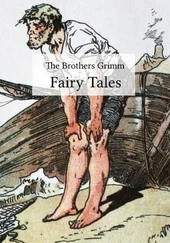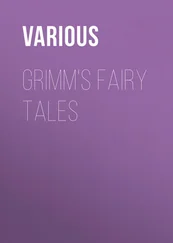Similar stories:Giambattista Basile: ‘Petrosinella’ ( The Great Fairy Tale Tradition , ed. Jack Zipes); Italo Calvino: ‘Prezzemolina’ ( Italian Folktales )
Like ‘The Frog King’, ‘Rapunzel’ survives in the popular mind as a single event rather than a connected narrative. The image of the yards of hair tumbling down from the window in the tower is unforgettable. But what happens before and after the hair episode is often forgotten. What about her poor parents, for example? They long for years to have a child, and then she’s born, and the witch takes her away, and then we hear no more about them. This is one way, of course, in which fairy tales are different from novels.
In later versions of the Grimm brothers’ tales, Wilhelm Grimm bowdlerized the exchange between Rapunzel and the witch that had existed in all previous versions, and indeed in the Grimms’ own first edition of 1812. Instead of revealing her pregnancy by saying that her clothes no longer fit, Rapunzel asks the witch why she is so much harder to pull up than the young prince. This is not an improvement: it makes her stupid instead of innocent. Besides, the story is preoccupied with pregnancy: according to Marina Warner, in From the Beast to the Blonde , the particular plant longed for by the wife, which was originally parsley, was a well-known abortifacient. What’s more, ‘Persinette’, the title of the de La Force story on which ‘Rapunzel’ is based, means ‘Little Parsley’.
EIGHT
THE THREE LITTLE MEN IN THE WOODS
Once there was a man whose wife died, and a woman whose husband died; and the man had a daughter, and so did the woman. The girls knew each other, and one day they went for a walk together, and they came to the woman’s house.
The woman took the man’s daughter aside, and when her own daughter wasn’t listening, she said, ‘You know, I’d like to marry your father. Tell him that, and see what he says. If he says yes, I promise you’ll have milk to wash your face in every day, it’s very good for your complexion, and wine to drink. And my daughter will only have water. That’s how much I’d like to marry him.’
The girl went home and told her father what the woman had said.
The man said, ‘Marry her? Oh, good grief. What shall I do? Marriage is delightful, but it can be a torment as well, you know.’
He couldn’t make up his mind. Finally, he pulled off his boot and said to his daughter, ‘Here, take this boot. It’s got a hole in the sole. Hang it up in the attic, and then fill it up with water. If it holds the water, I’ll take a wife, but if the water runs away then I won’t.’
The girl did as she was told. The water made the leather swell and squeeze the hole shut, so that when she filled up the boot, all the water stayed in it. The girl told her father, and he went up to the attic to see.
‘Well, fancy that! I shall have to marry her, then,’ he said. ‘You can’t go back once you’ve made a vow.’
He put his best suit on and went to woo the widow, and presently they were married.
Next morning when the two girls got up, the man’s daughter found there was milk for her to wash her face in and wine for her to drink. The woman’s daughter only had water.
On the second morning, both girls had water for washing and water to drink.
On the third morning, the man’s daughter had water, but the woman’s daughter had milk to wash in and wine to drink, and so it was on every morning after that.
The fact was that the woman hated her stepdaughter, and every day she thought of new ways to torment her. At the root of her hatred was bitter envy, because her stepdaughter was beautiful and sweet-tempered, whereas her own daughter was ugly and selfish, and not even full-cream milk made her complexion any nicer.
One winter’s day, when everything was frozen hard, the woman made a dress out of paper. She called her stepdaughter and said, ‘Here, put this on. Then go into the woods and gather some strawberries for me. I want some, and nothing else will do.’
‘But strawberries don’t grow in the winter,’ said the girl. ‘Everything’s covered in snow, and the ground’s as hard as iron. And why must I wear this dress made of paper? The wind will blow through it, and the brambles will tear it to pieces.’
‘Don’t you dare argue with me!’ said the stepmother. ‘Be on your way, and don’t come back till you’ve filled the basket with strawberries.’ Then she gave the girl a piece of bread as hard as wood. ‘Here’s your food,’ she said. ‘You’ll have to make it last all day, we’re not made of money.’
Secretly she thought, ‘If the cold doesn’t kill her, the hunger will, and I’ll never have to see her again.’
The girl did as she was told. She put on the flimsy paper dress and went out with the basket. Of course there was snow everywhere, with not a green leaf to be seen, far less a strawberry. She didn’t know where to look, so she went into the woods along a path she didn’t know, and soon she came to a little house that was about as high as her head. Sitting on a bench outside it smoking their pipes were three little men, each about as tall as her knee, as she saw when they all got up and bowed.
‘Good morning,’ she said.
‘What a nice girl!’ one of them said.
‘Well mannered,’ said a second.
‘Ask her in,’ said the third. ‘It’s cold.’
‘She’s wearing paper,’ said the first.
‘Fashionable, I expect,’ said the second.
‘Chilly, though,’ said the third.
‘Would you like to come inside, miss?’ they all said together.
‘How kind of you,’ she said. ‘Yes, I would.’
They knocked out their pipes before opening the door.
‘Mustn’t smoke near paper,’ said one.
‘Catch fire in a moment,’ said the second.
‘Terrible danger,’ said the third.
They gave her a little chair to sit on, and all three of them sat on a bench next to the fire. She felt hungry, so she took out her piece of bread.
‘Do you mind if I eat my breakfast?’ she said.
‘What is it?’
‘Just a piece of bread.’
‘Can we have a bit?’
‘Of course,’ she said, and broke it in two. It was so hard she had to knock it on the edge of the little table. She gave the little men the bigger bit, and started to gnaw the smaller one.
‘What are you doing out here in the wild woods?’ they said.
‘I’m supposed to gather strawberries,’ she said. ‘I don’t know where I’m going to find any, but I’m not allowed to go home till I’ve filled my basket.’
The first little man whispered something to the second, and the second whispered to the third, and then the third whispered to the first. Then they all looked at her.
‘Will you sweep the path for us?’ they said. ‘There’s a broom in the corner. Just clear the path a bit next to the back door.’
‘Yes, I’d be glad to,’ she said, and she took the broom and went out.
When she’d gone they said, ‘What shall we give her? Such a polite girl. Shared her bread with us, and it was all she had! Gave us the biggest bit! Kindly as well as polite. What shall we give her?’
And the first one said, ‘I’ll make sure she grows more and more beautiful each day.’
The second one said, ‘I’ll make sure that every time she speaks, a gold piece will fall from her mouth.’
The third one said, ‘I’ll make sure that a king will come along and marry her.’
Meanwhile, the girl was brushing away the snow from the path, and what did she find there but strawberries, dozens of them, as red and ripe as if it were summer. She looked back at the house, and she saw the three little men all looking from the back window. Yes, they nodded, go ahead, pick as many as you want.
Читать дальше












